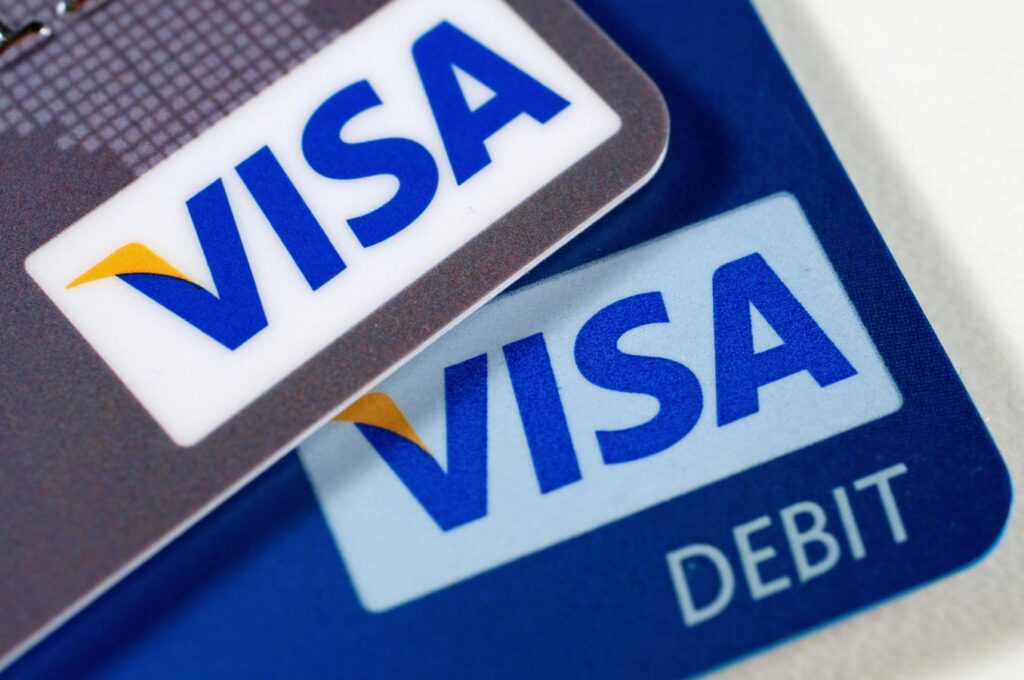U.S. Justice Department Accuses Visa of Illegal Monopoly that Adds to the Price of ‘Nearly Everything’
The U.S. Justice Department filed a lawsuit Tuesday accusing Visa of illegally monopolizing the debit card market. For more than a decade, the department alleges, Visa has abused its dominant position in the debit card market to force businesses to use Visa’s network instead of competitors’, and to stop new alternatives from entering the market. According to the new complaint against Visa, more than 60% of debit transactions in the country take place on Visa’s debit network. Visa, in turn, is able to charge more than $7 billion in processing fees on those transactions, the department says. To keep that control, Visa imposes exclusivity agreements that penalize vendors and banks who want to run transactions through different systems, effectively insulating the company from competition. [CNN]
American Airlines in Talks to Pick Citigroup over Rival Bank Barclays for Crucial Credit Card Deal
American Airlines is in talks to make Citigroup its exclusive credit card partner, dropping rival issuer Barclays from a partnership that dates back to the airline’s 2013 takeover of US Airways, according to people with knowledge of the negotiations. American has been working with banks and card networks on a new long-term deal for months, hoping to consolidate its business with a single player to boost the revenue haul from its cards. Airlines make billions from their loyalty programs and co-brand credit card deals. [CNBC]
Klarna Partners with Fellow Fintech Adyen to Bring Buy Now, Pay Later into Physical Stores
Swedish firm Klarna is partnering up with Dutch payments fintech Adyen to bring its popular buy now, pay later service into physical retail stores. The company said it had entered into an agreement with Adyen to add its payments products as an option at physical payment machines used by the Amsterdam-based fintech’s merchant partners. Klarna will be included as an option across more than 450,000 Adyen payment terminals in brick-and-mortar locations as a result of the deal, according to the companies. The partnership will initially launch in Europe, North America and Australia with a wider rollout planned later down the line. [CNBC]
Some Credit Card Companies Are Charging for Paper Statements
If you get a paper statement for your credit cards, you might want to check if you are being charged for it. Some credit card companies are now charging a fee to send paper statements in the mail. One consumer noticed she was getting charged $1.99 for the paper statement for her American Eagle credit card. The fee for paper statements is written in Synchrony Bank’s fine print, which provides credit cards to retailers like American Eagle. There is no federal law banning paper statement fees, but states can pass their own laws banning it. So far, only New York and Pennsylvania have banned the fees. [Gray News]
JP Morgan Plots New UK Credit Card in Challenge to Barclaycard
America’s biggest bank JP Morgan is plotting a new credit card for UK consumers in a looming challenge to Barclaycard. The lending giant is doing internal tests on a new credit card, which it has been planning for more than a year as part of its strategy to ramp up business in the UK. It will be the latest expansion for the bank’s UK retail arm Chase, which JP Morgan launched three years ago and has rapidly become one of the biggest digital banks in the country. [The Telegraph]
Shoppers Increasingly Buying Now, Paying Later
A potential sign that consumers might be feeling strapped as they move toward the holidays: Shoppers are expected to spend a record $18.5 billion through buy now, pay later financing this year, according to Adobe’s new forecast. That’s up more than 11% year over year. Shoppers are now seeing buy now, pay later everywhere, especially online. Around three-quarters of this spending happens on a mobile device. It’s also used more when peoples’ wallets are strained. [Marketplace]
Canceling Subscriptions Will Be a ‘One-Click’ Snap in California Under New Law
A growing number of products and services are being sold by online subscription, offering more convenience and customization but also a new set of problems for consumers. Companies have been accused of signing people up for subscriptions without their consent, renewing their subscriptions without notice, and imposing a gantlet of obstacles to anyone seeking to unsubscribe. Californians will soon be getting more protection against these sorts of abuses, however, including the right to unsubscribe with one click of the mouse. On Tuesday, Gov. Gavin Newsom signed into law Assembly Bill 2863, which imposes a series of safeguards. [Los Angeles Times]
Mastercard Enters ‘New Frontier’ in Sensory Marketing: A Haptic Logo
From sonic branding to perfumes and restaurants in New York and São Paulo, Mastercard has leveraged almost every sense to engage and assure customers. Now, it’s turning to touch. The brand is debuting a haptic logo, a distinctive series of vibrations that customers will “feel” via their phone when shopping online or using a payment terminal. The Mastercard chief marketing officer said the haptic logo is designed to increase trust, security, and satisfaction among shoppers. It is meant to reinforce the brand in that uncertain moment when a transaction is pending at checkout. [Adweek]
What Would A JPMorgan Apple Card Takeover Mean for The Banking-Fintech World?
JPMorgan Chase is reportedly in advanced negotiations to acquire the Apple Card credit card program from Goldman Sachs, a potential move that could reshape key dynamics in the banking sector, particularly for corporate treasury departments eyeing partnerships and operational efficiencies in an increasingly digital financial ecosystem. The deal highlights how partnerships between large financial institutions and tech giants are not only shaping consumer finance but are also impacting back-office processes and the operational models of large financial organizations. JPMorgan’s potential acquisition of the Apple Card portfolio would further entrench the bank as a dominant player in the digital payments ecosystem, a space corporate treasurers increasingly rely on to optimize their cash management strategies and improve liquidity solutions. [The Global Treasurer]
Moms Nationwide Are Leaving Gift Cards in Diaper Boxes. Here’s Why.
Moms across the country are anonymously buying gift cards or leaving cash in baby items at Target and Walmart stores because Denaesha Gonzalez saw a misplaced purse. The Nashville mom was with her 2-year-old son in her local Target this month when she noticed a familiar sight: a silver clutch handbag that retails for $20 misplaced on the shelf of the baby aisle. To the 28-year-old, this meant something deeper: A mom with a young child sacrificed something she wanted to buy something for her baby. She posted a 17-second video with the text: SHE DESERVED THE PURSE with the sound of a woman exhaling, in the hopes that maybe it would resonate with other mothers. Her video has since gone viral with more than 20 million views. It also has inspired people to hide money in diaper boxes and formula containers to allow a mom who is struggling to buy something for herself. [The Washington Post]
Hilton Launches the World’s First Hotel Loyalty Debit Cards
Hilton has unveiled the world’s first hotel debit cards in the UK: Hilton Honors Debit Card and Hilton Honors Plus Debit Card, in partnership with travel debit card platform Currensea. Cardholders will earn Hilton Honors Points on all eligible everyday spending to redeem on hotel stays or exclusive experiences. The cards offer an instant upgrade to elite status through Hilton’s award-winning loyalty program and provides card holders with exclusive travel perks: The Hilton Honors Debit Card automatically awards Silver Status and the Hilton Honors Plus Debit Card offers Gold Status, which includes benefits such as free continental breakfasts, free WIFI and space-available room upgrades. [Fintech Finance News]
KaiOS, Mastercard Partner to Enable Digital Payments for Small Business in Africa
KaiOS Technologies, the creator of a mobile operating system for smart feature phones, and global payments firm Mastercard have announced a partnership to integrate a range of digital payments solutions for small businesses in Africa and other emerging regions. The companies said in a joint statement that KaiOS’s affordable smart feature phones will leverage Mastercard’s payment technology and global network to drive acceptance and support the growth of the digital economy. [Connecting Africa]
Read the full article here











